Assessing the Health, Social, and Economic Wellbeing of Gulf Coastal Communities
The Health subteam began its work by conducting a systematic review of published health effects of oil spills and created a dynamic, searchable database of relevant literature. The database provides a clearinghouse for practitioners and researchers searching for relevant papers and reports on oil spill-health impacts. Of the 75 papers reviewed, 38 were published during or after 2010 and related to the DWH oil spill. To learn more, view CRGC’s Overview of the Health Literature Search and Database. To download the searchable database, please visit CRGC’s Resources Page.What Were Our Findings?

Photo by Petty Officer 3rd Class Patrick Kelley/FlickrA worker cleans up oily waste on Elmer’s Island, just west of Grand Isle, Louisiana
- Medium and Long-Term Effects Need Analysis: Research teams, collecting data less than a year after the DWH oil spill, published in 21 papers. Many of these studies find initial health and social well-being issues emerging after the oil spill, but continued efforts are needed to determine the medium and long-term effects.
- Multi-Organizational and Interdisciplinary Approaches are Valued: Many papers indicate that they are part of larger research efforts, which include multiple research institutions and disciplinary perspectives.
- Vulnerable Populations are Diverse: Researchers have focused on vulnerable populations, including the Vietnamese fishing population, residents seeking mental health treatment, renewable resource communities, women, and children.
- Knowledge Gaps Still Remain: Since the 2010 DWH oil spill, researchers have addressed recommendations in diverse ways, but some gaps still remain. We identified opportunities for research to inform the development of the Survey of Trauma, Resilience, and Opportunity of Neighborhoods in the Gulf (STRONG).
What is the Current Mental Health and Social Wellbeing of Gulf Coastal Residents?
We administered the STRONG questionnaire to 2,520 respondents via a random digit dial landline and cell phone survey (April-August, 2016) in the 56 coastal counties and parishes in Texas, Louisiana, Mississippi, Alabama, and Florida. The questionnaire included measures of:-
- Health: Physical, Mental, and Behavioral Health; Trauma History; Healthcare Utilization
- Exposure to the DWH Oil Spill: Clean-Up Activities; Damaged Property; Damaged Commercial Fisheries; Impact to Recreational Activities and/or Diet; Employment in Affected Industries
- Networked Adaptive Capacities: Social Capital; Community Competence; Information and Communication; Economic Development
Does Wellbeing Vary with Reported Exposure or Impact by County/Parish?
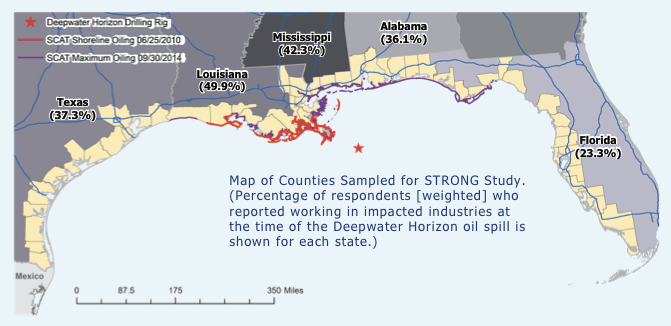
What are our Next Steps?
Data have been cleaned, post-stratification weights have been created to ensure results are representative of the region, and variables with missing values have been imputed. Analyses are currently underway for multiple peer-reviewed papers on:- Predictors of mental and behavioral health outcomes, with state-specific estimates.
- Worry about ongoing impacts as a function of recalled exposure and past victimization.
- Communication source preferences and trust in media.
- Impacts of the composition and structure of social networks on resilience.
Related News
Tulane’s Disaster Resilience Leadership Academy Hosts: Leadership in Peacetime and Crisis
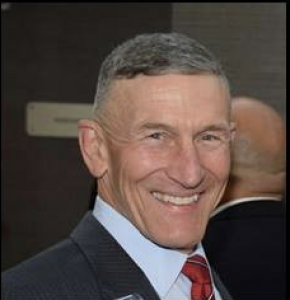 Major General Michael Regner (Image provided by DRLA)[/caption] On Saturday, December 2nd, Tulane’s Disaster Resilience Leadership Academy (DRLA) will welcome Major General Michael Regner, who will present Leadership in Peacetime and Crisis. Major General Regner will discuss topics including: (1) Resiliency in Peacetime and Crisis; (2) Crisis Communication; (3) Casualties – Civilians and Military Members; (4) Humanitarian Assistance and Cultural Awareness; and (5) Designing Your Leadership Philosophy. Learn more»
Major General Michael Regner (Image provided by DRLA)[/caption] On Saturday, December 2nd, Tulane’s Disaster Resilience Leadership Academy (DRLA) will welcome Major General Michael Regner, who will present Leadership in Peacetime and Crisis. Major General Regner will discuss topics including: (1) Resiliency in Peacetime and Crisis; (2) Crisis Communication; (3) Casualties – Civilians and Military Members; (4) Humanitarian Assistance and Cultural Awareness; and (5) Designing Your Leadership Philosophy. Learn more»
How to Rebuild After This Year’s Hurricane Season? Invest in Resilience!
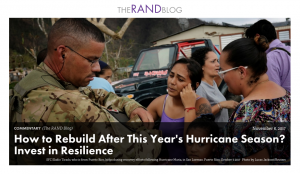 Check out the latest commentary on The RAND Blog! Director of CRGC, Melissa L. Finucane (@MelissaFinucane), who is a Senior Social and Behavioral Scientist at RAND, discusses the extremely active 2017 Atlantic hurricane season- as well as the range of risks posed by future disasters- and implications on community and infrastructure resilience in the Gulf of Mexico. Learn more»
Check out the latest commentary on The RAND Blog! Director of CRGC, Melissa L. Finucane (@MelissaFinucane), who is a Senior Social and Behavioral Scientist at RAND, discusses the extremely active 2017 Atlantic hurricane season- as well as the range of risks posed by future disasters- and implications on community and infrastructure resilience in the Gulf of Mexico. Learn more»
CRGC’s Drs. Finucane and Nicholls Contribute to National Academies Workshop on Preparing for a Rapid Response to Major Marine Oil Spills: Protecting and Assessing the Health and Well-Being of Communities
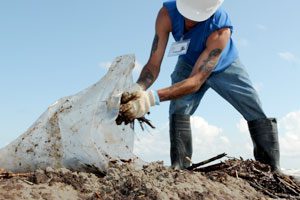 The National Academies of Sciences, Engineering, and Medicine recently released
Proceedings of the Workshop— in Brief, chronicling the presentations and discussions from Preparing for a Rapid Response to Major Offshore Oil Spills: A Workshop on Research Needs to Protect the Health and Well-Being of Communities. The two-day workshop, which Drs. Finucane and Nicholls participated in Aug 2-3 in Washington D.C., was organized by an ad hoc committee to facilitate cross-sector, transdiciplinary discussions around research needs and other opportunities for improving public health preparedness, response, and protection related to oil spills. Learn more»
The National Academies of Sciences, Engineering, and Medicine recently released
Proceedings of the Workshop— in Brief, chronicling the presentations and discussions from Preparing for a Rapid Response to Major Offshore Oil Spills: A Workshop on Research Needs to Protect the Health and Well-Being of Communities. The two-day workshop, which Drs. Finucane and Nicholls participated in Aug 2-3 in Washington D.C., was organized by an ad hoc committee to facilitate cross-sector, transdiciplinary discussions around research needs and other opportunities for improving public health preparedness, response, and protection related to oil spills. Learn more»
CRGC Director, Dr. Melissa Finucane, Shares Updates on Consortium’s Work & Research Findings
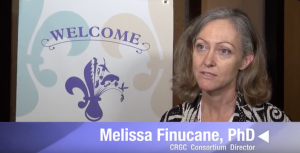 At this year’s Gulf of Mexico Oil Spill & Ecosystem Science Conference, The Gulf of Mexico Research Initiative (GoMRI) interviewed Dr. Melissa Finucane– Senior Social and Behavioral Scientist at the RAND Corporation and Director of The Consortium for Resilient Gulf Communities- about CRGC’s latest research findings and progress assessing and addressing the impacts of the 2010 Deepwater Horizon oil spill on the health, social, and economic wellbeing of people in the Gulf Coast region. Finucane speaks to CRGC’s research, outreach, and education initiatives, which are aimed at helping communities across the Gulf Coast to more effectively understand, withstand, and overcome the multiple stressors brought on by such disasters. Learn more>>
At this year’s Gulf of Mexico Oil Spill & Ecosystem Science Conference, The Gulf of Mexico Research Initiative (GoMRI) interviewed Dr. Melissa Finucane– Senior Social and Behavioral Scientist at the RAND Corporation and Director of The Consortium for Resilient Gulf Communities- about CRGC’s latest research findings and progress assessing and addressing the impacts of the 2010 Deepwater Horizon oil spill on the health, social, and economic wellbeing of people in the Gulf Coast region. Finucane speaks to CRGC’s research, outreach, and education initiatives, which are aimed at helping communities across the Gulf Coast to more effectively understand, withstand, and overcome the multiple stressors brought on by such disasters. Learn more>>
Reliable Data: The Most Empowering Tool for Hurricane Recovery
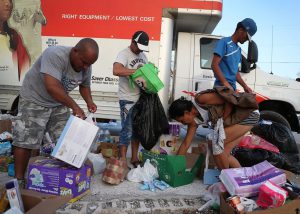 Accessibility to transparent, up to date data has proven to play a critical role in both individual- and community-level capacity to prepare for, respond to, and recover from disaster events, such as a hurricanes— Something that was especially evident following Hurricane Katrina. Denice W. Ross, a Public Interest Technology Fellow at New America and a co-founder of the Obama administration’s Police Data Initiative, spent more than a decade in New Orleans building community capacity to use government data and is continuing to broaden her work in the “open data” space by aggregating high-value data sets that can aid communities impacted by disaster. Learn more>>
Accessibility to transparent, up to date data has proven to play a critical role in both individual- and community-level capacity to prepare for, respond to, and recover from disaster events, such as a hurricanes— Something that was especially evident following Hurricane Katrina. Denice W. Ross, a Public Interest Technology Fellow at New America and a co-founder of the Obama administration’s Police Data Initiative, spent more than a decade in New Orleans building community capacity to use government data and is continuing to broaden her work in the “open data” space by aggregating high-value data sets that can aid communities impacted by disaster. Learn more>>
CRGC Team Member, Amy Lessen, Part of Collaborative to Help Isle de Jean Charles Tribe Build Resilience in the Face of Climate Change and Other Social & Environmental Challenges
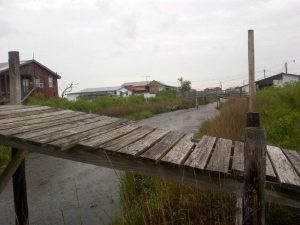 CRGC team member, Amy Lessen, a research associate professor with the ByWater Institute at Tulane University, is working on a collaborative, transdisciplinary effort to help the Isle de Jean Charles tribal community of southeastern Louisiana build resilience in the face of climate change and other social and environmental challenges. Read full story »
CRGC team member, Amy Lessen, a research associate professor with the ByWater Institute at Tulane University, is working on a collaborative, transdisciplinary effort to help the Isle de Jean Charles tribal community of southeastern Louisiana build resilience in the face of climate change and other social and environmental challenges. Read full story »
Grad Student Parks Assesses How Disasters and Social Factors Influence Human Health
 GoMRI features CRGC grad student, Vanessa Parks, and her work compiling and analyzing data on Gulf Coast communities that explores how the Deepwater Horizon oil spill affected mental and physical health as well as how social factors contributed to post-disaster health outcomes. Learn more »
GoMRI features CRGC grad student, Vanessa Parks, and her work compiling and analyzing data on Gulf Coast communities that explores how the Deepwater Horizon oil spill affected mental and physical health as well as how social factors contributed to post-disaster health outcomes. Learn more »
CRGC Releases New Database of Potential Sources on Fisheries, Tourism, and Oil Spill Claims
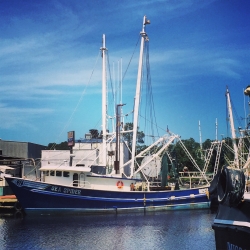 CRGC researchers working on assessing and addressing the economic impacts of the oil spill developed a new resource to assist business owners and employers, researchers, community members, and other stakeholders in locating information on the fisheries and tourism sectors, and on oil spill claims, from a wide variety of potential sources. Check out the Database and User Guide on CRGC’s new Resources page!
CRGC researchers working on assessing and addressing the economic impacts of the oil spill developed a new resource to assist business owners and employers, researchers, community members, and other stakeholders in locating information on the fisheries and tourism sectors, and on oil spill claims, from a wide variety of potential sources. Check out the Database and User Guide on CRGC’s new Resources page!
Customize Your Search For Resilient Gulf Resources: CRGC Launches New Resources Webpage
 CRGC is pleased to announce the launch of its new and improved Resources page, now live on the Consortium’s website. CRGC offers an exciting range of resources tailored for academics, community leaders, fishing/seafood industry stakeholders, healthcare providers, and policymakers that span across an array topic areas.
CRGC is pleased to announce the launch of its new and improved Resources page, now live on the Consortium’s website. CRGC offers an exciting range of resources tailored for academics, community leaders, fishing/seafood industry stakeholders, healthcare providers, and policymakers that span across an array topic areas.
GoMRI eNews: March 21, 2017 Edition
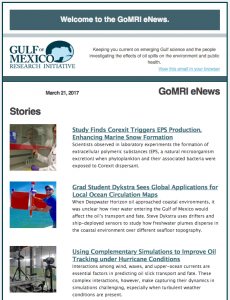 Check out the latest edition of GoMRI’s eNews, which keeps researchers, students, community members, and other stakeholders working in the field current on emerging Gulf science and the people investigating the effects of oil spills on the environment and public health. This edition of eNews features, CRGC’s Student Spotlight of Nicholas Thomas, in the Project Activities section! Learn more »
Check out the latest edition of GoMRI’s eNews, which keeps researchers, students, community members, and other stakeholders working in the field current on emerging Gulf science and the people investigating the effects of oil spills on the environment and public health. This edition of eNews features, CRGC’s Student Spotlight of Nicholas Thomas, in the Project Activities section! Learn more »



